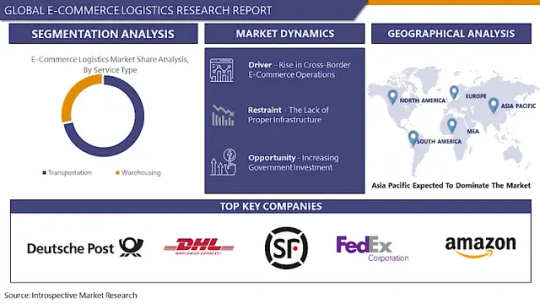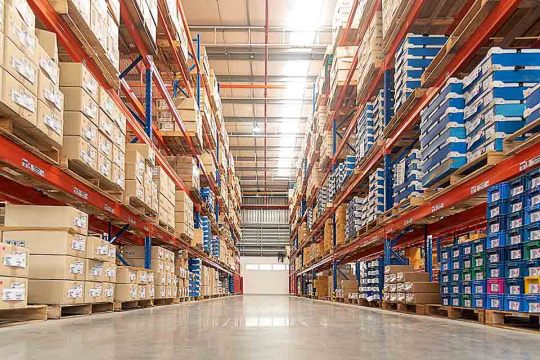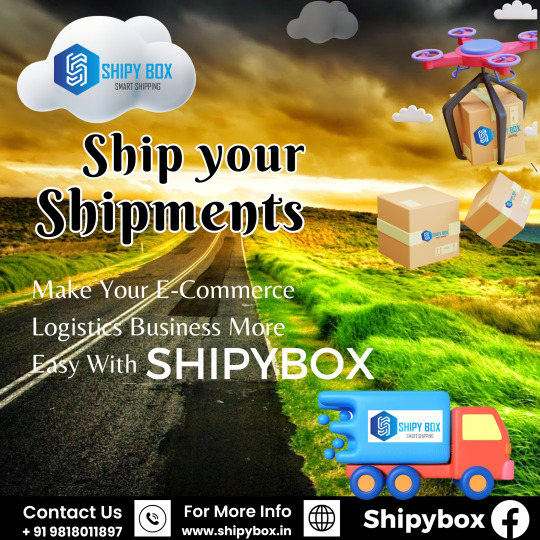#E-commerce Logistics
Text
Sustainability in Motion: E-Commerce Logistics and Environmental Responsibility

The Global E-Commerce Logistics Market size is expected to grow from USD 591636 million in 2022 to USD 667365.41 million by 2030, at a CAGR of 12.80% during the forecast period (2023-2030).
The e-commerce sector has been experiencing exponential growth globally, fueled by increasing internet penetration, smartphone usage, and changing consumer behavior. This growth has led to higher demand for efficient and reliable logistics solutions to handle the movement of goods from sellers to buyers.
Consumers are increasingly expecting faster delivery times, with same-day and next-day delivery becoming the new standard. E-commerce logistics providers are striving to meet these expectations by optimizing their operations and partnering with local delivery networks. Retailers are adopting omni-channel strategies to provide customers with seamless shopping experiences across online and offline channels. This trend is driving the integration of e-commerce logistics with traditional brick-and-mortar supply chains, leading to the development of multi-modal transportation solutions.
Get Full PDF Sample Copy of Report: (Including Full TOC, List of Tables & Figures, Chart) @
https://introspectivemarketresearch.com/request/14747
Updated Version 2024 is available our Sample Report May Includes the:
Scope For 2024
Brief Introduction to the research report.
Table of Contents (Scope covered as a part of the study)
Top players in the market
Research framework (structure of the report)
Research methodology adopted by Worldwide Market Reports
Moreover, the report includes significant chapters such as Patent Analysis, Regulatory Framework, Technology Roadmap, BCG Matrix, Heat Map Analysis, Price Trend Analysis, and Investment Analysis which help to understand the market direction and movement in the current and upcoming years.
Leading players involved in the E-Commerce Logistics Market include:
Deutsche Post AG (Germany), DHL International GmbH (Germany), FedEx Corporation (USA), SF Express Co. Ltd. (China), Amazon.com Inc. (USA), United Parcel Service, Inc. (USA), Clipper Logistics Plc. (United Kingdom), CEVA Logistics (Switzerland), C.H. Robinson Worldwide Inc. (USA), Kerry Logistics Network Limited (Hong Kong) and Other Major Players
If You Have Any Query E-Commerce Logistics Market Report, Visit:
https://introspectivemarketresearch.com/inquiry/14747
Segmentation of E-Commerce Logistics Market:
By Service Type
Transportation
Warehousing
By Operational Area
International
Domestic
Market Segment by Regions: -
North America (US, Canada, Mexico)
Eastern Europe (Bulgaria, The Czech Republic, Hungary, Poland, Romania, Rest of Eastern Europe)
Western Europe (Germany, UK, France, Netherlands, Italy, Russia, Spain, Rest of Western Europe)
Asia Pacific (China, India, Japan, South Korea, Malaysia, Thailand, Vietnam, The Philippines, Australia, New Zealand, Rest of APAC)
Middle East & Africa (Turkey, Bahrain, Kuwait, Saudi Arabia, Qatar, UAE, Israel, South Africa)
South America (Brazil, Argentina, Rest of SA)
What to Expect in Our Report?
(1) A complete section of the E-Commerce Logistics market report is dedicated for market dynamics, which include influence factors, market drivers, challenges, opportunities, and trends.
(2) Another broad section of the research study is reserved for regional analysis of the E-Commerce Logistics market where important regions and countries are assessed for their growth potential, consumption, market share, and other vital factors indicating their market growth.
(3) Players can use the competitive analysis provided in the report to build new strategies or fine-tune their existing ones to rise above market challenges and increase their share of the E-Commerce Logistics market.
(4) The report also discusses competitive situation and trends and sheds light on company expansions and merger and acquisition taking place in the E-Commerce Logistics market. Moreover, it brings to light the market concentration rate and market shares of top three and five players.
(5) Readers are provided with findings and conclusion of the research study provided in the E-Commerce Logistics Market report.
Our study encompasses major growth determinants and drivers, along with extensive segmentation areas. Through in-depth analysis of supply and sales channels, including upstream and downstream fundamentals, we present a complete market ecosystem.
If you require any specific information that is not covered currently within the scope of the report, we will provide the same as a part of the customization.
Acquire This Reports: -
https://introspectivemarketresearch.com/checkout/?user=1&_sid=14747
About us:
Introspective Market Research (introspectivemarketresearch.com) is a visionary research consulting firm dedicated to assisting our clients to grow and have a successful impact on the market. Our team at IMR is ready to assist our clients to flourish their business by offering strategies to gain success and monopoly in their respective fields. We are a global market research company, that specializes in using big data and advanced analytics to show the bigger picture of the market trends. We help our clients to think differently and build better tomorrow for all of us. We are a technology-driven research company, we analyse extremely large sets of data to discover deeper insights and provide conclusive consulting. We not only provide intelligence solutions, but we help our clients in how they can achieve their goals.
Contact us:
Introspective Market Research
3001 S King Drive,
Chicago, Illinois
60616 USA
Ph no: +1-773-382-1047
Email: [email protected]
#E-Commerce Logistics#E-Commerce Logistics Market#E-Commerce Logistics Market Size#E-Commerce Logistics Market Share#E-Commerce Logistics Market Growth#E-Commerce Logistics Market Trend#E-Commerce Logistics Market segment#E-Commerce Logistics Market Opportunity#E-Commerce Logistics Market Analysis 2023
0 notes
Text
Unveiling the Amazon Hub Counter: Revolutionizing Package Pickup
Introduction
Discover the convenience of Amazon Hub Counter, a secure and hassle-free way to pick up and return packages at convenient locations near you. Benefit from easy access, flexible hours, and reliable service for all your Amazon deliveries.
In the age of convenience-driven consumerism, the demand for streamlined delivery services has skyrocketed. Recognizing this trend, Amazon, the…

View On WordPress
#Amazon delivery solutions#Amazon Hub Counter#Counter partner program#E-commerce logistics#Package management#Partnering with Amazon#Small business collaboration#Store integration#Supply chain optimization
0 notes
Text
In today’s fast-paced world of logistics innovation and evolution have become the driving forces behind success. As we step into 2024, the logistics sector will undergo extensive disruptions, fueled by game-changing innovations that promise to revolutionize supply chain management as we know it.
At iFour, we take immense pride in our expertise in the logistics industry, and we are excited to share with you the trends that are currently transforming this dynamic sector in Australia. As a leading custom Logistics software development company, we understand the unique challenges and opportunities facing businesses in the Australian market.
Here are the key trends that are reshaping the logistics landscape and how our solutions can help your company stay ahead of the curve.
#Supply Chain Technology#E-commerce Logistics#Automation and Robotics#Blockchain in Logistics#Sustainable and Green Logistics#Last-Mile Delivery Solutions#Data Analytics and Predictive Insights#3D Printing in Logistics#IoT (Internet of Things) in Supply Chain#Artificial Intelligence in Transportation#On-Demand and Sharing Economy Logistics#Digital Twins in Warehousing#Autonomous Vehicles and Drones#Climate Change and Resilience Planning#Cross-Border Trade and Customs#Cybersecurity in Supply Chain#Inventory Management Strategies#Reverse Logistics and Returns#Multi-Modal Transportation#software outsourcing#software development company#.net development
0 notes
Link
Discover the Future of E-commerce! The Open Network for Digital Commerce (ONDC) is an initiative by the Indian government that aims to promote inclusivity in the e-commerce sector. Small retailers in India have been facing challenges in dealing with large e-commerce companies that charge exorbitant fees, leading to higher purchase costs and limited options for small retailers. ONDC seeks to address this issue by offering an alternative platform that charges significantly lower fees, thereby enabling micro, small, and medium enterprises, as well as small traders, to participate in online marketplaces.
For More Information: https://penzu.com/p/1f47010b
0 notes
Text
E-Commerce Logistics Services Mumbai | Warehousing & Delivery Solutions

When it comes to e-commerce logistics services Mumbai, Pace Projects and Logistics is here to meet your needs. We understand the importance of efficient warehousing and delivery solutions for your online business. With our expertise in international e-commerce logistics, we can help you ship your products to customers around the world. By partnering with Pace, you can rest assured that your goods will be handled with care and delivered on time. Our experienced team is well-versed in the intricacies of international shipping, ensuring smooth operations and timely deliveries.
#E-Commerce Logistics Services Mumbai#E-Commerce Logistics Solutions in Mumbai#E-Commerce Courier Service#E-Commerce Logistics
0 notes
Text
The electrification of commercial vehicle fleets has significantly transformed e-commerce logistics by enabling Economical and efficient operations - Etrio

The e-commerce industry is integral to India’s digital transformation, and the Digital India program launched by the government has facilitated this transformation. Today, the digitally connected world has changed buying habits and the Pandemic only accelerated this transformation. The Indian consumer can obtain a wide range of products and services at their doorstep by leveraging the advantage of e-commerce platforms.
With the growth of e-commerce, small and medium-sized enterprises (SMEs) have expanded their businesses by leveraging digital platforms to reach new customers.
With the growth of e-commerce, there has been a significant increase in the demand for logistics services, particularly last-mile delivery. The electrification of e-commerce logistics has helped the industry by reducing delivery costs, improving efficiency, and lowering carbon emissions.
The Indian government has set of goal of 100% new EV sales in last mile segment by 2030 and is actively encouraging the adoption of electric vehicles (EVs) in e-commerce logistics by rolling out several tax incentives and subsidies for EV manufacturers and buyers.
In addition to the cost and efficiency benefits, the electrification of e-commerce logistics can also help to reduce air pollution and improve the health of communities.
Overall, as the digital economy continues to expand, e-commerce is expected to play an even more significant role in shaping the future of India’s economy.
The widespread adoption of electric three-wheelers and electric trucks for inter-city and intra-city cargo transportation and the transition to electric vehicles for commercial purposes and e-commerce logistics will have far-reaching benefits for India’s economy and society.
0 notes
Text
What is e-commerce logistics
Welcome to our blog post about e-commerce logistics! In today’s digital age, the world of e-commerce has experienced a massive surge in popularity and growth. With more and more consumers choosing to shop online, it’s no surprise that businesses are investing in their online presence. However, with this growth comes the need for an effective logistics strategy to ensure seamless operations from order placement to delivery. In this article, we will explore the importance of e-commerce logistics and how finding the right service provider can have a significant impact on your business's success. So let's dive in and learn all about Logistics For E-Commerce!
Importance of e-commerce logistics
E-commerce logistics is critical for the success of any online business. The process involves managing operations from order placement to delivery, ensuring that customers receive their purchases in a timely and efficient manner.
One of the most significant benefits of having an effective e-commerce logistics strategy is customer satisfaction. Customers expect fast and reliable shipping options, as well as accurate tracking information. By providing these services, businesses can build trust with their customers and encourage repeat business.
Another advantage of e-commerce logistics india is cost savings. Efficient inventory management systems reduce storage costs and minimize waste associated with overstocking or stockouts. Additionally, optimized order fulfillment processes decrease labor costs associated with manual tasks such as picking and packing.
An effective e-commerce logistics system also helps businesses gain a competitive advantage by streamlining operations and offering faster shipping times than competitors who may not have invested in a similar strategy.
1. Customer Satisfaction:
When it comes to e-commerce logistics, customer satisfaction should be your top priority. In today's competitive market, customers expect fast and reliable delivery of their purchases. Any delays or mishaps can quickly lead to negative reviews and loss of business.
To ensure customer satisfaction in best e-commerce logistics service, you need to provide a seamless experience from start to finish. This means offering clear and accurate tracking information on shipments and providing multiple delivery options for the convenience of your customers.
2. Cost Savings:
One of the most significant benefits of e-commerce logistics is cost savings. With an efficient logistics system in place, businesses can reduce their operational costs and increase their profits. This is because a good logistics service provider can help businesses streamline their supply chain processes and eliminate any unnecessary expenses.
For instance, by outsourcing its warehousing and shipping needs to a third-party logistics (3PL) provider that has economies of scale, an e-commerce business can save money on storage space and transportation costs. The 3PL provider can also negotiate better rates with carriers due to its large volume of shipments.
3. Inventory Management:
Effective inventory management is a crucial aspect of e-commerce logistics. It ensures that businesses maintain an optimal stock level, thus preventing both overstocking and stockouts. This balance is essential in meeting customer demands while minimizing storage costs.
One key component of successful inventory management involves real-time visibility into stock levels. Access to accurate information allows businesses to make informed decisions about reordering products, adjusting pricing strategies or running promotions on slow-moving items.
4. Competitive Advantage:
In the world of e-commerce, a competitive advantage can make all the difference between success and failure. With so many businesses vying for customers' attention online, having a logistics strategy that sets you apart from your competition is essential.
An efficient e-commerce logistics provider can help streamline processes such as order fulfillment, inventory management, and shipping. This enables businesses to offer their customers faster delivery times and more accurate tracking information.
5. Increased Efficiency:
One of the greatest benefits that e-commerce logistics can provide is increased efficiency. With an effective logistics system in place, businesses can streamline their operations and reduce the time it takes to get products from point A to point B.
This increased efficiency has a number of advantages for both businesses and customers. For one, it means faster delivery times, which can be a huge selling point for online shoppers who are looking for instant gratification.
6. Data Analytics:
In the world of e-commerce logistics, data analytics is a game-changer. Access to real-time data and insights allows businesses to make informed decisions that can optimize their operations.
By analyzing customer behavior patterns and order histories, e-commerce companies can tailor their services accordingly. This helps in predicting future trends for product demand as well as identifying areas where they need improvement.
With these insights, businesses can also improve their inventory management by tracking stock levels and reducing wastage of resources. Data analytics plays an important role in enhancing supply chain efficiency by optimizing delivery routes, improving delivery times and ensuring on-time deliveries.
7. Global Reach:
One of the biggest advantages of e-commerce logistics is its global reach. With the rise of online shopping, businesses can now sell their products to customers all around the world. However, this also poses a challenge for logistics service providers as they need to have an extensive network and infrastructure in place to handle international shipments.
To ensure that your e-commerce business reaches a wider audience, it's important to partner with a logistics provider that has experience in handling cross-border shipments. This includes having knowledge about customs regulations, documentation requirements and shipping rates.
How to find the best e-commerce logistics service provider
When it comes to finding the best e-commerce logistics service provider for your business, there are several factors you need to consider. Here are some tips that can help you make an informed decision:
Firstly, conduct thorough research and compare different providers before making a final decision. Look for reviews and testimonials from past clients to see if they were satisfied with their services.
Secondly, experience and expertise are crucial when it comes to selecting a logistics service provider. Choose a company that has been in the industry for years and has extensive knowledge of e-commerce logistics trends.
Thirdly, evaluate the delivery network of the potential providers. Your chosen partner should have access to various modes of transportation such as air, sea or road transport depending on your specific needs.
Fourthly, technology integration is essential when choosing an e-commerce logistics service provider. They should be able to integrate their systems with yours seamlessly and provide real-time updates on shipment tracking.
Fifthly, customer service is key in any business relationship. Select a provider who offers excellent customer support through multiple channels like phone calls or live chats.
Sixthly, cost-effectiveness is vital since every penny counts in business operations. Look for providers who offer competitive pricing while still delivering high-quality services within your budget constraints.
Seventhly scalability ensures that your chosen logistics partner can cater to your growing demands effectively without compromising quality standards.
Finally environmentally sustainability must be considered as well so choose companies who prioritize eco-friendly practices such as using electric-powered vehicles instead of fuel guzzlers
In conclusion finding an ideal e-commerce logistics partner entails taking into account all these considerations - research & comparison; experience & expertise; delivery capabilities; tech integration; customer support; price competitiveness; scalability & environmental consciousness- will ultimately lead you towards making a wise investment decision which will positively impact both your brand’s reputation and bottom line profitability .
1. Research and comparison:
When it comes to finding the best e-commerce logistics service provider, research and comparison are key factors to consider. You want to ensure that you choose a company that is reliable, efficient, and cost-effective.
Firstly, start by researching different logistics companies online. Use search engines and directories to find providers in your area or those who specialize in your industry. Make a list of potential candidates based on their offerings and services.
2. Experience and expertise:
When choosing an e-commerce logistics service provider, it is crucial to consider their experience and expertise in the field. Experience brings with it a wealth of knowledge and insight that can only be gained through years of working within the industry.
Look for providers who have a proven track record of success in handling e-commerce logistics operations. They should understand the unique challenges associated with online retail, such as managing high volumes of small orders and dealing with returns.
Expertise is also important when selecting an e-commerce logistics service provider. You want to partner with a company that has deep knowledge about the latest trends and technologies in this space, so they can offer you innovative solutions to help your business grow.
3. Delivery network:
One of the most critical aspects to consider when choosing an e-commerce logistics service provider is their delivery network. A reliable and efficient delivery network ensures that your products reach your customers in a timely manner, increasing customer satisfaction.
When evaluating a potential logistics partner's delivery network, it's crucial to take into account their coverage area. The wider their reach, the better equipped they are to handle orders from different parts of the world.
Another important factor to consider is the speed at which they can deliver products. Fast shipping times can be a significant competitive advantage as customers expect quick deliveries.
4. Technology integration:
In today's digital age, technology is a vital aspect of any business operation, and e-commerce logistics is no exception. Technology integration can significantly impact the performance and efficiency of your logistics operations.
Firstly, integrating technology into your e-commerce logistics allows for real-time tracking of shipments. This feature enables customers to track their orders from the warehouse to their doorstep, providing them with peace of mind that they will receive their purchases within the agreed timeframe.
Secondly, automated inventory management systems reduce manual errors in stock updates and ensure product availability at all times. By streamlining this process, it frees up time for staff to focus on other critical aspects of the business.
5. Customer service:
Exceptional customer service is a crucial aspect of e-commerce logistics that cannot be overlooked. When you select a reliable logistics provider, they must prioritize excellent communication and assistance for both your business and its customers.
One critical element of exceptional customer service involves providing timely updates on shipment status. Customers appreciate transparency in the shipping process, and prompt notifications about their order's progress help to enhance trust.
6. Cost-effectiveness:
When it comes to best e-commerce logistics, cost-effectiveness is one of the most important factors to consider. As a business owner, you want to ensure that you are getting the best value for your money while still providing quality services to your customers.
One way to achieve cost-effectiveness in e-commerce logistics is by partnering with a service provider that offers competitive pricing. This means finding a provider who can offer affordable rates without compromising on quality.
Make sure any potential service providers are transparent about their pricing structure and any hidden fees or charges involved in their services. A trustworthy provider will be upfront about all costs associated with their offerings.
Prioritizing cost-effectiveness in e-commerce logistics requires careful consideration of various factors such as pricing structures, optimization of shipping processes and transparency around all costs involved.
7. Scalability:
When it comes to e-commerce logistics, scalability is a crucial factor that businesses must consider. Scalability refers to the ability of a logistics provider to adjust and adapt their services according to the changing needs and demands of an e-commerce business.
As your business grows, so does your need for efficient logistics solutions. A scalable logistics provider can accommodate these changes without compromising on quality or efficiency. This ensures that you always have the necessary resources in place to meet customer demand and keep your operations running smoothly.
One way that a logistics provider can demonstrate scalability is through flexible pricing models. Look for providers who offer tiered pricing structures based on volume or frequency of shipments, as this allows you to scale your usage up or down as needed.
Another important consideration when evaluating a provider's scalability is their technological capabilities. Make sure they have systems in place that are designed with growth in mind, such as automated inventory management tools and real-time tracking updates.
Choosing a scalable e-commerce logistics provider means setting yourself up for long-term success by ensuring you have the flexibility and support needed to grow alongside your business.
8. Easy integration with your systems:
When it comes to e-commerce logistics, one of the most crucial aspects is how well the service provider can integrate with your existing systems. This includes everything from inventory management software to customer relationship management tools.
It's also important to consider whether the service provider has experience integrating with similar businesses in your industry. This can give you added confidence in their ability to meet your specific needs and requirements.
Ultimately, choosing an e-commerce logistics partner that offers easy integration can save valuable time and resources down the line. It allows you to focus on growing your business instead of getting bogged down by manual processes.
9. Environmental sustainability:
In today's world, environmental sustainability is no longer a luxury but a necessity. E-commerce businesses must prioritize this aspect when choosing their logistics partner to not only meet the growing demands of eco-conscious customers but also contribute positively towards the environment.
A top-notch e-commerce logistics provider will have measures in place to minimize their carbon footprint and promote sustainable practices throughout the supply chain. Some service providers utilize energy-efficient warehouses with solar panels or use electric vehicles for transportation, reducing greenhouse gas emissions significantly.
In essence, partnering with an e-commerce logistics provider committed to environmental sustainability allows you both to grow responsibly and make a positive impact on our planet - all while catering to the evolving needs of your customer base.
Conclusion
To sum it up, e-commerce logistics is a crucial aspect of any online business. It plays a significant role in determining the success or failure of your venture. With increasing competition and changing customer expectations, businesses need to choose the right logistics service provider that can offer them cost-effective solutions without compromising on quality.
By considering factors such as research, experience, delivery network, technology integration, customer service, cost-effectiveness, scalability, easy integration with systems and environmental sustainability while selecting an e-commerce logistics provider - you can ensure that your business runs smoothly and efficiently.
So if you're planning to start an online store or looking for ways to improve your existing e-commerce operations - make sure to focus on finding the best logistics partner that aligns with your goals and objectives. After all, by doing so - you'll be able to boost customer satisfaction levels while increasing profitability in the long run!
0 notes
Text
How Automation Can Scale Up e-Commerce Logistics Management | Ordazzle

E-commerce logistics is a complex and challenging endeavour. As online sales continue to grow, companies are looking for ways to scale up their operations and manage the increased demand. Automation can be a valuable tool in this effort, helping to streamline processes and optimize resources.
In this article, we’ll look at how automation can help e-commerce businesses meet the needs of their customers. We’ll also discuss some of the benefits of automation and outline some of the key considerations when implementing it into your e-commerce logistics strategy.
When automation meets e-commerce logistics management
In the e-commerce world, logistics management refers to the process of controlling and coordinating the transportation and distribution of goods. E-commerce logistics generally involve a higher volume of smaller shipments than traditional logistics and often require more complex routing and tracking. E-commerce businesses need to track inventory levels and customer orders in real-time and must be able to quickly adapt to changes in demand.
E-commerce logistics can be complex and time-consuming, but automation can help e-commerce businesses to manage their logistics more efficiently. Automation can help e-commerce businesses to keep track of inventory levels, automate order fulfilment, and schedule deliveries. By automating e-commerce logistics, businesses can free up time and resources that can grow their business.
These solutions range from simple shipping plugins to advanced order management platforms that provide real-time visibility into the entire supply chain. As e-commerce continues to grow, e-commerce logistics will probably become even more sophisticated, making it easier for businesses to get their products to customers quickly and efficiently.
How automation helps in scaling up e-commerce logistics management
As e-commerce continues to grow in popularity, businesses are increasingly turning to automation in order to scale their e-commerce logistics management. Automation can help to improve efficiency and accuracy while also reducing the need for manual intervention. In particular, e-commerce automation can help with tasks such as inventory management, order fulfilment, and shipping. By automating these processes, businesses can free up time and resources that can be used for other tasks, such as marketing and growing customer loyalty.
Additionally, e-commerce automation can help to improve the customer experience by reducing errors and delays. Ultimately, automation is a powerful tool that can help e-commerce businesses to optimize their operations and improve the bottom line.
How an automated e-commerce logistics platform works
E-commerce logistics platforms are a key element in the e-commerce ecosystem, providing the infrastructure and tools necessary to manage e-commerce operations. E-commerce logistics management encompasses the coordination and execution of e-commerce shipping and delivery operations. E-commerce logistics platforms can provide a wide range of benefits to businesses, including increased efficiency, improved customer service, and reduced costs.
E-commerce management platforms, such as Ordazzle, streamline the e-commerce logistics process by automating and integrating all key e-commerce functions from start to finish. E-commerce management platforms also provide e-commerce businesses with the tools they need to manage their logistics, such as tracking multiple orders from multiple marketplaces and being delivered by multiple carriers at the same time, while handling manifests, shipping labels, and invoices.
For instance, Ordazzle simplifies the end-to-end e-commerce logistics management by ensuring seamless out-of-the-box integration with more than 60 unique shipping carriers, including DHL, FedEx, Ninja Van, Entrego and many others, across multiple continents and enabling interfacing with non-integrated players as well. Ordazzle automates the coordination needed to successfully interact with each logistics provider, servicing each marketplace or webstore, for each item in each order.
How to choose the right e-commerce logistics management platform
Deciding on which e-commerce management platform to use for your business can seem daunting – there are many factors to consider, and it is important to choose a platform that will allow your e-commerce business to grow. However, by keeping a few key points in mind, you can narrow down your options and choose the right platform for your business.
To start, consider what you need from an e-commerce management software. Do you need a platform with built-in logistics management or one that integrates with third-party logistics providers? Alternatively, you may need a platform with e-commerce automation capabilities to save you time on tasks such as inventory management and order fulfilment.
Finally, think about whether you need a platform that is customizable and scalable. If you plan to list a large number of products or offer complex distribution options, you will need a platform that can accommodate your needs. On the other hand, if you only plan to sell a few products, a less complex platform may be sufficient.
Not all e-commerce and logistics management platforms are created equal when it comes to usability. Make sure you choose a platform that is easy to use and navigate, even for those who are not tech-savvy.
By keeping these factors in mind, you can be sure to choose the right e-commerce enablement with an automated logistics management platform for your business.
The e-commerce logistics landscape is constantly evolving, and it’s important to stay ahead of the curve. Automation is one of the key ways that businesses can scale up their operations and improve efficiency.
That’s why we offer Ordazzle Logistics Management, as part of an integrated management platform that automates many of the key functions of e-commerce logistics. If you’re looking for a platform that can help you deliver your products to your customers with maximum efficiency, then look no further. Contact us today to learn more about how Ordazzle can help your business grow.
0 notes
Text
How Automation Can Scale Up e-Commerce Logistics Management | Ordazzle

How automation can help scale e-commerce logistics management
E-commerce logistics is a complex and challenging endeavour. As online sales continue to grow, companies are looking for ways to scale up their operations and manage the increased demand. Automation can be a valuable tool in this effort, helping to streamline processes and optimize resources.
In this article, we’ll look at how automation can help e-commerce businesses meet the needs of their customers. We’ll also discuss some of the benefits of automation and outline some of the key considerations when implementing it into your e-commerce logistics strategy.
When automation meets e-commerce logistics management
In the e-commerce world, logistics management refers to the process of controlling and coordinating the transportation and distribution of goods. E-commerce logistics generally involve a higher volume of smaller shipments than traditional logistics and often require more complex routing and tracking. E-commerce businesses need to track inventory levels and customer orders in real-time and must be able to quickly adapt to changes in demand.
E-commerce logistics can be complex and time-consuming, but automation can help e-commerce businesses to manage their logistics more efficiently. Automation can help e-commerce businesses to keep track of inventory levels, automate order fulfilment, and schedule deliveries. By automating e-commerce logistics, businesses can free up time and resources that can grow their business.
These solutions range from simple shipping plugins to advanced order management platforms that provide real-time visibility into the entire supply chain. As e-commerce continues to grow, e-commerce logistics will probably become even more sophisticated, making it easier for businesses to get their products to customers quickly and efficiently.
How automation helps in scaling up e-commerce logistics management
As e-commerce continues to grow in popularity, businesses are increasingly turning to automation in order to scale their e-commerce logistics management. Automation can help to improve efficiency and accuracy while also reducing the need for manual intervention. In particular, e-commerce automation can help with tasks such as inventory management, order fulfilment, and shipping. By automating these processes, businesses can free up time and resources that can be used for other tasks, such as marketing and growing customer loyalty.
Additionally, e-commerce automation can help to improve the customer experience by reducing errors and delays. Ultimately, automation is a powerful tool that can help e-commerce businesses to optimize their operations and improve the bottom line.
How an automated e-commerce logistics platform works
E-commerce logistics platforms are a key element in the e-commerce ecosystem, providing the infrastructure and tools necessary to manage e-commerce operations. E-commerce logistics management encompasses the coordination and execution of e-commerce shipping and delivery operations. E-commerce logistics platforms can provide a wide range of benefits to businesses, including increased efficiency, improved customer service, and reduced costs.
E-commerce management platforms, such as Ordazzle, streamline the e-commerce logistics process by automating and integrating all key e-commerce functions from start to finish. E-commerce management platforms also provide e-commerce businesses with the tools they need to manage their logistics, such as tracking multiple orders from multiple marketplaces and being delivered by multiple carriers at the same time, while handling manifests, shipping labels, and invoices.
For instance, Ordazzle simplifies the end-to-end e-commerce logistics management by ensuring seamless out-of-the-box integration with more than 60 unique shipping carriers, including DHL, FedEx, Ninja Van, Entrego and many others, across multiple continents and enabling interfacing with non-integrated players as well. Ordazzle automates the coordination needed to successfully interact with each logistics provider, servicing each marketplace or webstore, for each item in each order.
How to choose the right e-commerce logistics management platform
Deciding on which e-commerce management platform to use for your business can seem daunting – there are many factors to consider, and it is important to choose a platform that will allow your e-commerce business to grow. However, by keeping a few key points in mind, you can narrow down your options and choose the right platform for your business.
To start, consider what you need from an e-commerce management software. Do you need a platform with built-in logistics management or one that integrates with third-party logistics providers? Alternatively, you may need a platform with e-commerce automation capabilities to save you time on tasks such as inventory management and order fulfilment.
Finally, think about whether you need a platform that is customizable and scalable. If you plan to list a large number of products or offer complex distribution options, you will need a platform that can accommodate your needs. On the other hand, if you only plan to sell a few products, a less complex platform may be sufficient.
Not all e-commerce and logistics management platforms are created equal when it comes to usability. Make sure you choose a platform that is easy to use and navigate, even for those who are not tech-savvy.
By keeping these factors in mind, you can be sure to choose the right e-commerce enablement with an automated logistics management platform for your business.
The e-commerce logistics landscape is constantly evolving, and it’s important to stay ahead of the curve. Automation is one of the key ways that businesses can scale up their operations and improve efficiency.
That’s why we offer Ordazzle Logistics Management, as part of an integrated management platform that automates many of the key functions of e-commerce logistics. If you’re looking for a platform that can help you deliver your products to your customers with maximum efficiency, then look no further. Contact us today to learn more about how Ordazzle can help your business grow.
0 notes
Text
E-Commerce Logistics Market: Global Industry Analysis and Forecast 2023 – 2030

The Global E-Commerce Logistics Market size is expected to grow from USD 591636 million in 2022 to USD 667365.41 million by 2030, at a CAGR of 12.80% during the forecast period (2023-2030).
The term "E-commerce logistics" is used to describe the transportation and supply chain management processes that facilitate the flow of commodities and services in the e-commerce sector.
It involves the preparation, implementation, and management of the physical, informational, and monetary processes necessary to complete an online purchase and has it delivered to the customer.
E-commerce logistics involves various tasks, including order processing, inventory management, warehousing, packaging, transportation, last-mile delivery, and returns management. It requires efficient coordination and integration of these activities to ensure timely and accurate delivery of products to customers, as well as efficient handling of returns and exchanges.
E-commerce logistics is critical to the success of online stores and marketplaces because it affects the bottom line, consumer loyalty, and the value of the company's identity. It presents its own set of difficulties, such as dealing with large numbers of orders, satisfying customers' demands for speedy deliveries, processing refunds, and coordinating among a wide variety of parties in the supply chain.
Get Full PDF Sample Copy of Report: (Including Full TOC, List of Tables & Figures, Chart) @
https://introspectivemarketresearch.com/request/14747
The latest research on the E-Commerce Logistics market provides a comprehensive overview of the market for the years 2023 to 2030. It gives a comprehensive picture of the global E-Commerce Logistics industry, considering all significant industry trends, market dynamics, competitive landscape, and market analysis tools such as Porter's five forces analysis, Industry Value chain analysis, and PESTEL analysis of the E-Commerce Logistics market. Moreover, the report includes significant chapters such as Patent Analysis, Regulatory Framework, Technology Roadmap, BCG Matrix, Heat Map Analysis, Price Trend Analysis, and Investment Analysis which help to understand the market direction and movement in the current and upcoming years. The report is designed to help readers find information and make decisions that will help them grow their businesses. The study is written with a specific goal in mind: to give business insights and consultancy to help customers make smart business decisions and achieve long-term success in their particular market areas.
Leading players involved in the E-Commerce Logistics Market include:
Deutsche Post AG (Germany), DHL International GmbH (Germany), FedEx Corporation (USA), SF Express Co. Ltd. (China), Amazon.com Inc. (USA), United Parcel Service, Inc. (USA), Clipper Logistics Plc. (United Kingdom), CEVA Logistics (Switzerland), C.H. Robinson Worldwide Inc. (USA), Kerry Logistics Network Limited (Hong Kong) and Other Major Players
If You Have Any Query E-Commerce Logistics Market Report, Visit:
https://introspectivemarketresearch.com/inquiry/14747
Segmentation of E-Commerce Logistics Market:
By Service Type
Transportation
Warehousing
By Operational Area
International
Domestic
Market Segment by Regions: -
North America (US, Canada, Mexico)
Eastern Europe (Bulgaria, The Czech Republic, Hungary, Poland, Romania, Rest of Eastern Europe)
Western Europe (Germany, UK, France, Netherlands, Italy, Russia, Spain, Rest of Western Europe)
Asia Pacific (China, India, Japan, South Korea, Malaysia, Thailand, Vietnam, The Philippines, Australia, New Zealand, Rest of APAC)
Middle East & Africa (Turkey, Bahrain, Kuwait, Saudi Arabia, Qatar, UAE, Israel, South Africa)
South America (Brazil, Argentina, Rest of SA)
What to Expect in Our Report?
(1) A complete section of the E-Commerce Logistics market report is dedicated for market dynamics, which include influence factors, market drivers, challenges, opportunities, and trends.
(2) Another broad section of the research study is reserved for regional analysis of the E-Commerce Logistics market where important regions and countries are assessed for their growth potential, consumption, market share, and other vital factors indicating their market growth.
(3) Players can use the competitive analysis provided in the report to build new strategies or fine-tune their existing ones to rise above market challenges and increase their share of the E-Commerce Logistics market.
(4) The report also discusses competitive situation and trends and sheds light on company expansions and merger and acquisition taking place in the E-Commerce Logistics market. Moreover, it brings to light the market concentration rate and market shares of top three and five players.
(5) Readers are provided with findings and conclusion of the research study provided in the E-Commerce Logistics Market report.
Our study encompasses major growth determinants and drivers, along with extensive segmentation areas. Through in-depth analysis of supply and sales channels, including upstream and downstream fundamentals, we present a complete market ecosystem.
If you require any specific information that is not covered currently within the scope of the report, we will provide the same as a part of the customization.
Acquire This Reports: -
https://introspectivemarketresearch.com/checkout/?user=1&_sid=14747
About us:
Introspective Market Research (introspectivemarketresearch.com) is a visionary research consulting firm dedicated to assisting our clients to grow and have a successful impact on the market. Our team at IMR is ready to assist our clients to flourish their business by offering strategies to gain success and monopoly in their respective fields. We are a global market research company, that specializes in using big data and advanced analytics to show the bigger picture of the market trends. We help our clients to think differently and build better tomorrow for all of us. We are a technology-driven research company, we analyse extremely large sets of data to discover deeper insights and provide conclusive consulting. We not only provide intelligence solutions, but we help our clients in how they can achieve their goals.
Contact us:
Introspective Market Research
3001 S King Drive,
Chicago, Illinois
60616 USA
Ph no: +1-773-382-1047
Email: [email protected]
#E-Commerce Logistics#E-Commerce Logistics Market#E-Commerce Logistics Market Size#E-Commerce Logistics Market Share#E-Commerce Logistics Market Growth#E-Commerce Logistics Market Trend#E-Commerce Logistics Market segment#E-Commerce Logistics Market Opportunity#E-Commerce Logistics Market Analysis 2023
0 notes
Text

Flostream’s 45,000 sq ft Warehouse is the home for our vast range of professional warehousing services, including e-commerce fulfilment, pick and pack, and more.
Get in touch with us today for e-commerce warehousing solution!
#Warehouse Storage#E-Commerce Fulfillment Services#Warehousing Storage Solutions#Logistics#FloStream
2 notes
·
View notes
Text
Myntra plans to employ 16,000 employees during the holiday season.
Myntra plans to employ 16,000 employees during the holiday season.
India’s leading e-commerce company Myntra has announced that it will be hiring nearly 16,000 people directly and indirectly.
Commenting on the hiring process the company said, “Myntra is creating 16000 job opportunities for our upcoming Big Fashion Festival (BFF) as 6000+ brands gear up to bring a whopping 1.5 million styles to ensure a delightful festive season for our customers.”
Myntra is…

View On WordPress
#customer support jobs#delivery jobs#e-commerce jobs#Hiring#JObs#Logistics jobs#metro city jobs#myntra mass hiring#warehouse jobs
2 notes
·
View notes
Text

Are you tired of dealing with the hassle of shipping and logistics for your e-commerce business?
Look no further, because Shipybox is here to revolutionize your operations!
We handle everything from warehousing to order fulfillment, so you can focus on what you do best - growing your business.
Now Hassle-Free Delivery PAN India with Shipybox.
Streamlining the supply chain, one shipment at a time.
say goodbye to the complexities of shipping.
Best E-Commerce Logistics Services
#e-commerce#Shipybox#shipping#fulfillment#logistics#delivery#shippingsoftware#shippingcosts#shippingoptions#CourierServices
0 notes
Link
India’s technology-focused economy has been significantly impacted by the rise of E-commerce. The widespread acceptance of the “anything-anywhere-anytime” shopping concept has led to substantial growth in the nation’s digital commerce market. As a result, it is projected that the revenue generated from E-commerce will reach US$71. 9 billion by 2023, with a potential growth rate of up to 13. % over the next five years. This suggests that the E-commerce sector will continue to play a crucial role in India’s economic progress and development.
For More Information: https://justpaste.it/cmmh4
0 notes
Text
International Medicine Courier Services Mumbai: Delivering Health

Pace Express is your trusted partner for international medicine courier services in Mumbai. We understand the importance of timely and secure delivery when it comes to prescription medications. Whether you're residing in the United Kingdom, the United States, the UAE, New Zealand, Australia, Canada, or any other country worldwide, we are here to deliver health to your doorstep. If you're living abroad and facing the challenge of finding your prescribed medicines online, worry no more. Our dedicated team at Pace Express will assist you in sourcing your required medications exclusively sold in India. Simply provide us with your prescription, and we will reach out to reputed pharmacies across the country.
#International Medicine Courier Services Mumbai#E-Commerce Logistics Solutions in Mumbai#E-Commerce Courier Service#E-Commerce Logistics
0 notes